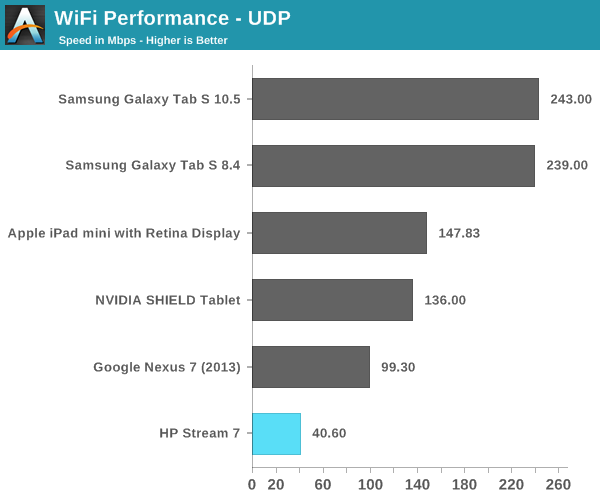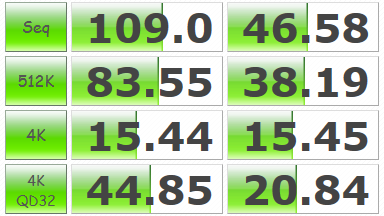HP Stream 7 Review: A $119 Windows Tablet
by Brandon Chester on December 19, 2014 8:00 AM ESTCamera
It looks like including a camera is now a requirement for pretty much any device, and so even the Stream 7 has a front-facing and a rear-facing camera. In the Windows device manager, the front camera identifies itself as "Camera Sensor GC310". I haven't been able to find any information about it, but the image quality leads me to believe that it may be best for people to not know where it came from. The rear camera idenitifes itself as HM2056, which I was able to find information about. It's made by a company called Himax Imaging, and if you haven't heard of them it's okay, because I hadn't either. It's a 2MP 1/5" sensor, which translates to 1.75 micron pixels. It has no auto focus, and that combined with the specifications leads me to believe that this is normally intended to be a front-facing sensor.
As you can see, the output is really bad. The text on the back of the books is illegible, most detail is lost, and there's noise everywhere. It's just honestly not a good camera, and it's something I would only use as a last resort. It's somewhat annoying that HP felt the need to even put a rear camera on the Stream 7, as it adds to the BOM and the money could have been better used on something like a larger battery.
NAND
I mentioned earlier that the Stream 7 doesn't even have enough storage to fit PCMark 8 and some of the other benchmarks we use. Out of the box, you get around 18.5GB free. This means that we can't run our typical Windows storage benchmarks, so I've used CrystalDiskMark to get an idea of how the storage performs.
I wouldn't try making direct comparisons between this and our storage benchmarks on Android and iOS, but it's still able to give you an idea of what you can expect. The Stream 7 uses Samsung's MGB4GC eMMC solution, so we can't expect the same storage performance that you get from Windows devices with a full blown SSD. The read and write performance ends up being pretty good for an eMMC solution, although I'm suspicious of the 4k random write result considering how even the best eMMC solutions we've seen in Android and iOS tablets top out around 3MB/s.
WiFi
The HP Stream 7 uses a Realtek RTL8723BS solution for WiFi and Bluetooth. This is a single spatial stream 802.11n part, with no 5GHz support and only 20MHz channel width. That means that we're dealing with a theoretical maximum speed of 72Mbps. In real world use, it's quite a bit less, as you can see below.

Again, at $119 this is expected and can be excused. Faster WiFi would be nicer, but it's not free. My only complaint about this speed in the real world is that the slow WiFi makes it difficult to move large files over the network onto the Stream 7. This wouldn't be an issue if these Windows tablets allowed you to directly move files to them from another computer over USB, but they don't. I've also encountered issues with the WiFi disconnecting intermittently, which is incredibly frustrating when it means you have to begin transferring a large video from the beginning. I've contacted HP about this to see if they're aware of this issue, as I've seen complaints about it from other users, but I haven't received a response.
Misc
I am unfortunately not equipped to do objective audio testing on the Stream 7. It uses Realtek's audio codec, and so it isn't likely to be anything exceptional. The bottom mono speaker is adequate; there's not much to be said about it. Unfortunately, everything comes crashing down when you try to use the 3.5mm jack. Even if the Stream 7 had the best audio solution in the world, it would be crippled by this defect that I cannot believe made it to production.
Essentially, the 3.5mm jack has a great deal of noise and static, and it makes it effectively unusable. I have confirmed this with two other owners, and there are complaints about it on the web. It's likely that there's an insufficient amount of shielding for the audio port and PCB connections, and it's extremely disappointing. With its support for all the great video players on Windows, the Stream 7 could have been an inexpensive and powerful video player. But unless you're going to use the built-in speaker or Bluetooth headphones/speakers, there's no way to listen to audio on this tablet. When I reached out to HP about the WiFi connection issues I also asked about this, but again I haven't received a response.


















157 Comments
View All Comments
ados_cz - Monday, December 22, 2014 - link
Me too in my Linx 7.name99 - Friday, December 19, 2014 - link
As an alternative point of view, I'd like to point out that I (and I assume some other AnandTech readers) do NOT see every review as a rabid badge of tribalism. Rather, I'm interested in the state of the ENTIRE industry as a whole, and exceptional devices (whether exceptionally low-priced, exceptionally high performance, exceptionally high levels of interest) from any ecosystem are interesting, simply to see where things are going.cruzinforit - Friday, December 19, 2014 - link
Speak for yourself- I'm very interested in a cheap windows 7 tablet. I wouldn't pay more than this for one as I don't really need it. I have a full Windows 8.1 15" Ultrabook as my mobile device and my smartphone. I'm glad they cover the full gamut, from high end stuff to low end stuff like this.Infinite_Reality - Friday, December 19, 2014 - link
This isn't a boring device, did you happen to read the article? I bought one of these day one and it is very impressive for a $99 device.purplestater - Sunday, December 21, 2014 - link
because there are people interested in small tablets who couldn't care less about smartphonesWolfpup - Tuesday, December 23, 2014 - link
I think this is one of the more interesting things they could review. "No one in their right mind" cares about it? Eh? But they do care about Chinese imports?Err...actually this Stream stuff is a pretty major launch that lots of people care about, and this is potentially a really good deal (sounds like really only killed by the headphone jack).
I find reviews of things like this much more interesting/useful than like a review of the newest iPad which we pretty much know what it is and gets massive coverage.
darkbreeze - Friday, December 26, 2014 - link
This IS actually of interest to many of us. In fact, I just bought one last week after seeing it in OfficeMax for 99 bucks. My only interest in a tablet is portability for automotive diagnostics and since all my diagnostic applications run on the windows platform, Android or iOS is not an option.It works great and with a micro-USB to my wireless adapter for my OBDII reader I can now watch and diagnose in real time with no cords or bulky laptop to move around.
Acreo Aeneas - Tuesday, January 13, 2015 - link
Just because you might not care for a budget-oriented Windows tablet does not mean others are (as the replies below your comment speak to). Personally, I know little of the smartphone and tablet side of Windows mobile and this tablet has definitely piqued my interest (to say the least). I have friends and colleagues who are in the Windows sphere and want a Windows tablet for work. This is a nice cheap alternative without them learning a new OS (Android, iOS) and dealing with mismatches between a Windows desktop and a Android/iOS mobile device (very average users).noorish - Thursday, February 12, 2015 - link
I actually searched for this item and was happy to find this informative article, it is a "tablet" not a cell phone and I for one am glad to get some more info. Thanksdarryl hall - Monday, June 15, 2015 - link
"boring device..." Try asking anyone who has on a whim picked this up. I haven't bothered to charge my iPad 4 in months. Unfortunately reviewers typically don't have the attention span to get a handle of a device before they review it. The desktop mode works so much better. pair the HP stream with the free virtualmouse app and the whole screen becomes a trackpad leaving you with a very capable full windows desktop in your back pocket. Any semi capable desktop OS is inherently more powerful and flexible than a mobile OS. I wish some publication would do a review of the actual desktop performance--which utilizes the native processing power of the hardware instead of focusing on only the metro subsystem.